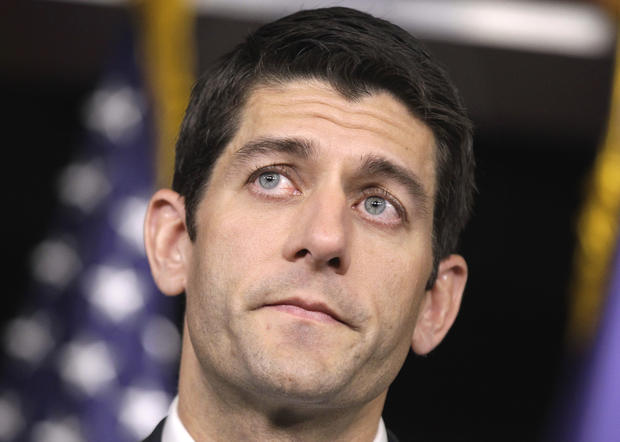Paul Ryan's budget: What's in the GOP plan?
House GOP Budget chairman Paul Ryan of Wisconsin unveiled a budget today that would reduce the deficit by $4.4 trillion over ten years by repealing the Democrat's health care bill, reforming entitlements like Medicare and Medicaid and making cuts to defense that were endorsed by Defense Secretary Robert Gates. It also imposes hard spending caps on domestic spending.
The reforms and cuts already have Democrats accusing Republicans of trying to balance the budget on the backs of the poor and will surely be a hot topic for GOP presidential contenders in 2012.
The House Budget Committee will begin amending the plan tomorrow. The House budget with spending targets could be on the floor as early as next week, but could be delayed by the ongoing fight over this year's budget. Once the House passes a budget resolution, it is up to the regular committees to decide how to implement the Ryan plan and what specifically to cut to reach his targets.
Paul Ryan lauded for putting forth plan - but many in GOP silent on the specifics
Here are some of the most controversial elements of the House GOP's 2012 budget titled "The Path to Prosperity:"
Health Care:
The GOP budget would fulfill a 2010 campaign promise to repeal President Obama's most significant accomplishment, the Affordable Care Act. A significant chunk of the GOP's cuts come from overturning this provision. They save $725 billion by repealing the subsidies that customers would have received to help buy health insurance.
Medicare Reform:
Medicare would drastically change as part of the Republican budget. Instead of the government reimbursing doctors and hospitals for certain medical services, seniors would purchase a private health care plan among numerous options on an exchange. The government would then pay the private insurer in the form of a subsidy up to a specified amount.
This provision, which is based on a proposal the budget chairman crafted with former OMB Director Alice Rivlin, would increase help for the sick and poor while shifting more cost to wealthy seniors. Republican proponents say this will bring down the price of health insurance because of increased competition and shifting of resources to those who really need it. Democrats claim that Republicans are cutting benefits for the elderly.
Changes to Medicare in the plan would not affect those currently age 55 and over.
Medicaid:
House Republicans would overhaul Medicaid by changing the way the federal government finances the program. Today, it is a matching program which means if a state adds more Medicaid recipients to the rolls in the case of a recession, the federal government helps with that cost by matching a certain percentage.
The GOP plan would change the program by block granting it - which means giving a set number of funds to the states. Proponents of this plan say it will give governors the flexibility to administer the Medicaid program as they see fit while giving the federal government some control over the cost.
Tax Reform:
Details are still murky -- The "Path to Prosperity" does outline a plan to lower the highest individual and corporate tax rates from 35 percent to 25 percent and to make up for that revenue by closing tax loopholes, eliminating special carve outs and tax credits. They also argue that allowing individuals and businesses to keep more money will help grow the economy at a faster rate. But the report does not get into specific tax credits and carve outs that would be eliminated other than making clear some energy and agricultural subsidies would be eliminated.
Social Security:
"In the event that the Social Security Program is not sustainable" the GOP budget plan would require the president and the House and Senate to all come up with ideas to ensure the program's solvency. But Ryan does not offer his own plan on how to ensure Social Security's long-term viability.
Energy Subsidies:
Ryan accuses the president of "picking winners and losers" in the energy field. The House GOP budget would count on revenues from lifting drilling moratoriums both on and offshore.
